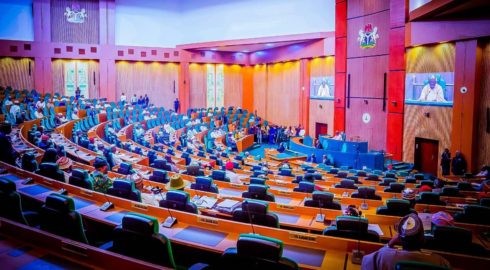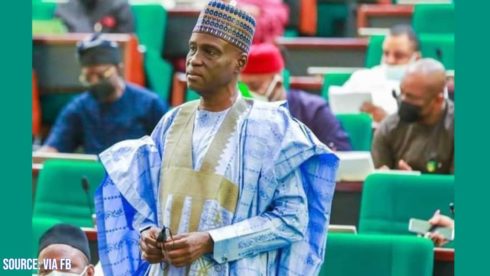The members of the Nigerian House of Representatives have unanimously voted to reduce their salaries by half for a period of six months. This decision, taken as a gesture of solidarity with the Nigerian populace, aims to address the pressing economic challenges and food insecurity faced by the nation. The lawmakers, who currently earn a monthly salary of N600,000, will now contribute 50% of their earnings to aid in alleviating the country’s economic strain.
Deputy Speaker of House Of Representative, Benjamin Okezie Kalu, who proposed the amendment to the motion, highlighted the urgency of the situation. “This is a time for shared sacrifice,” Kalu stated. “By reducing our salaries, we are sending a clear message that we stand with the Nigerian people during these difficult times.” The motion was met with widespread approval among the lawmakers, reflecting a unified stance in the face of the country’s economic difficulties.
Influences and Motivations Behind the Decision
The decision to reduce salaries was influenced by a proposal from Rep. Isiaka Ayokunle, who called on the advocates of upcoming nationwide protests to reconsider their plans and engage in dialogue with the government instead. Ayokunle’s proposal emphasized the need for constructive discussions and collaborative efforts to address the country’s challenges, rather than resorting to protests that could further destabilize the nation.
Deputy Speaker Kalu echoed Ayokunle’s sentiments, stating that the salary reduction would not only demonstrate the lawmakers’ commitment to the cause but also provide tangible support to the federal government’s initiatives aimed at combating the soaring prices of food items. “We believe that this gesture will inspire other sectors to join in and contribute to the efforts to stabilize our economy,” Kalu added.
Impact on Government Initiatives and Public Perception
The salary reduction is expected to have a significant impact on the government’s ongoing efforts to manage the economic crisis. By channeling these funds into initiatives designed to lower food prices and improve food security, the lawmakers aim to provide immediate relief to struggling Nigerians. This move is also seen as a way to rebuild trust and confidence in the government, showing that elected officials are willing to share in the sacrifices required to navigate through the economic turbulence.
Public reaction to the announcement has been largely positive, with many Nigerians expressing hope that this will mark the beginning of more inclusive and empathetic governance. Economic analysts have praised the move as a step in the right direction, though they caution that more comprehensive measures will be needed to address the root causes of the country’s economic woes. As the government continues to roll out its initiatives, the support and sacrifice demonstrated by the House of Representative are expected to play a crucial role in the overall strategy to restore economic stability.
Mixed Reactions to House of Representative’ Salary Reduction Initiative
The recent initiative by the House of Representative to reduce their salaries by half has garnered significant attention and diverse reactions from the public. Many have taken to social media to express their views, with opinions ranging from commendation to skepticism.
Umar Zarmar, via his Twitter handle, praised the House of Representative for their gesture but raised concerns about the sustainability of such a measure. He pointed out, “I commend the House Of Representative for their kind gesture. But the thing is, we are looking at something that will be sustainable, not a half-baked solution. What will happen after six months? Why are we always looking at short-term solutions instead of long-term problem-solving?” Zarmar’s comments highlight a common sentiment that while the salary reduction is a step in the right direction, it may not address deeper systemic issues.
Similarly, Bello Aminu expressed mixed feelings about the initiative. He tweeted, “Commendable indeed … 600k multiplied by the number of lawmakers, the ordinary 219,000,000, only being a kind gesture at this critical situation, right.” Aminu’s remarks suggest that while the salary cut is seen as a positive move, its overall impact on the nation’s financial woes might be minimal.
Calls for Broader Reforms and Transparency
Other critics have called for more extensive reforms, arguing that reducing salaries alone is insufficient. Keth Uttit suggested that lawmakers should focus on slashing their allowances instead. He tweeted, “Peanuts. Slash the allowances instead, that one they appropriate for themselves indiscriminately which they don’t allow the public to see, yes those allowances.” Uttit’s statement underscores a call for greater transparency and accountability in the allocation of funds within the legislature.
Felix Yohanna, another vocal critic, emphasized the need for the House of Representative to address more pressing issues affecting the country. He tweeted, “I could have loved to see them take the initiative to the executive urging them to do something about the high prices of petrol, diesel, food crisis, naira value, and insecurity, not this. How can reducing their salaries by 50% help over 100 million hungry Nigerians?” Yohanna’s comments reflect a widespread concern that the salary reduction might be a symbolic gesture rather than a substantive solution to the nation’s economic challenges.
The varied reactions to the salary reduction initiative reveal a broader conversation about the effectiveness and priorities of the House of Representative. While some view the move as a positive step towards fiscal responsibility, others argue for more comprehensive and transparent reforms to address the country’s pressing issues.
Table of Contents
Discover more from OGM News NG
Subscribe to get the latest posts sent to your email.













